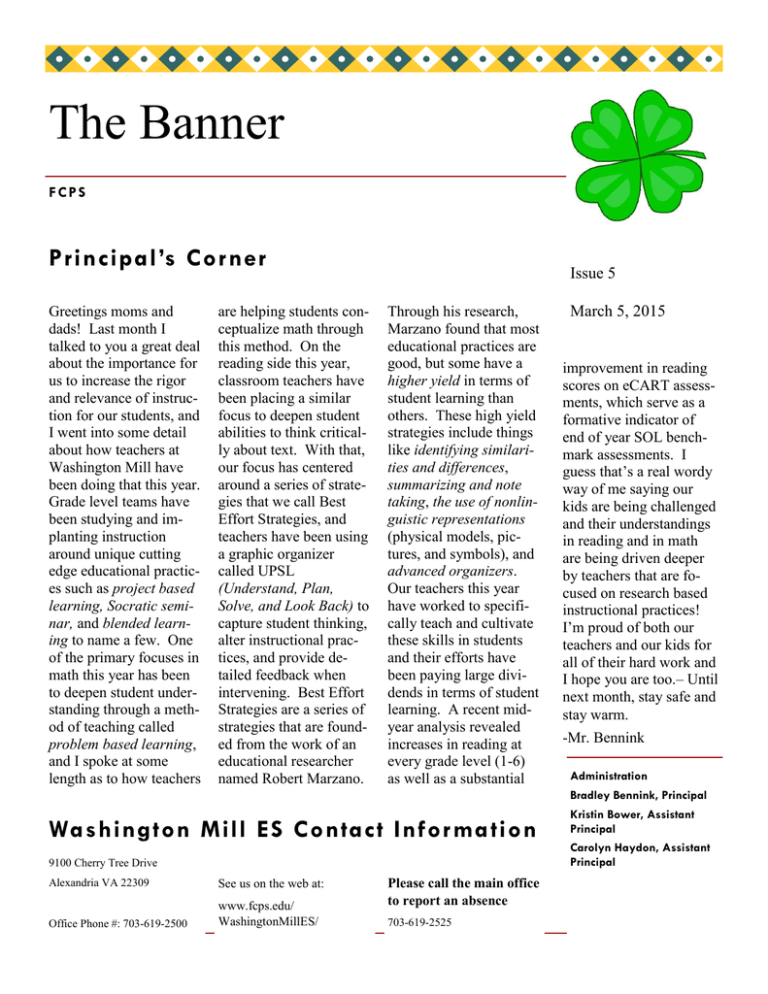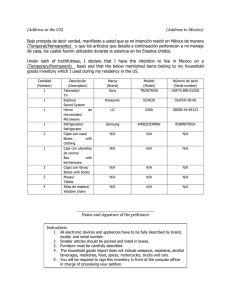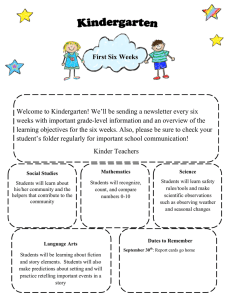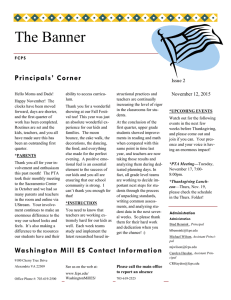The Banner
Anuncio

The Banner FCPS Principal’s Corner Greetings moms and dads! Last month I talked to you a great deal about the importance for us to increase the rigor and relevance of instruction for our students, and I went into some detail about how teachers at Washington Mill have been doing that this year. Grade level teams have been studying and implanting instruction around unique cutting edge educational practices such as project based learning, Socratic seminar, and blended learning to name a few. One of the primary focuses in math this year has been to deepen student understanding through a method of teaching called problem based learning, and I spoke at some length as to how teachers are helping students conceptualize math through this method. On the reading side this year, classroom teachers have been placing a similar focus to deepen student abilities to think critically about text. With that, our focus has centered around a series of strategies that we call Best Effort Strategies, and teachers have been using a graphic organizer called UPSL (Understand, Plan, Solve, and Look Back) to capture student thinking, alter instructional practices, and provide detailed feedback when intervening. Best Effort Strategies are a series of strategies that are founded from the work of an educational researcher named Robert Marzano. Issue 5 Through his research, Marzano found that most educational practices are good, but some have a higher yield in terms of student learning than others. These high yield strategies include things like identifying similarities and differences, summarizing and note taking, the use of nonlinguistic representations (physical models, pictures, and symbols), and advanced organizers. Our teachers this year have worked to specifically teach and cultivate these skills in students and their efforts have been paying large dividends in terms of student learning. A recent midyear analysis revealed increases in reading at every grade level (1-6) as well as a substantial March 5, 2015 improvement in reading scores on eCART assessments, which serve as a formative indicator of end of year SOL benchmark assessments. I guess that’s a real wordy way of me saying our kids are being challenged and their understandings in reading and in math are being driven deeper by teachers that are focused on research based instructional practices! I’m proud of both our teachers and our kids for all of their hard work and I hope you are too.– Until next month, stay safe and stay warm. -Mr. Bennink Administration Bradley Bennink, Principal Washington Mill ES Contact Infor ma tion 9100 Cherry Tree Drive Alexandria VA 22309 See us on the web at: Office Phone #: 703-619-2500 www.fcps.edu/ WashingtonMillES/ Please call the main office to report an absence 703-619-2525 Kristin Bower, Assistant Principal Carolyn Haydon, Assistant Principal Saludos! mamás, papás. El mes anterior hablé con mucho énfasis acerca de la importancia de que los educadores aumenten el rigor, la relevancia, de la instrucción para nuestros estudiantes. También hablé con detalles, cómo los profesores en Washington Mill, están logrando este objetivo en el presente año escolar. Los equipos de profesores, según cada grado, han estado estudiando e implantando este tipo de instrucción en cada grado, centrándose alrededor de las prácticas educativas únicas de vanguardia tales como; Seminario socrático, y aprendizaje combinado, solo para nombrar algunos de estas nuevas formas de enseñar. El enfoque básico en la matemática, en este año, ha sido guiar a los estudiantes a un entendimiento más profundo de las matemáticas a través de un nuevo método llamado, aprendizaje en base a problemas. También hablé, y con cierta extensión, en cómo los maestros están ayudando a los estudiantes a conceptualizar las matemáticas a través de este método. En lectura en este año escolar, los profesores, están haciendo el mismo énfasis; Un conocimiento más profundo, y habilidades para pensar de una forma más crítica en los textos que están usando. Con esto, nuestro enfoque se ha centrado en torno a una serie de estrategias que las llamamos; Estrategias para un Esfuerzo de Excelencia (Best Effort Strategies). Los profesores están usando organizadores gráficos llamados: Entender, Planear, Resolver y Revisar (UPSL), para captar la forma de pensar de los estudiantes, cambiar prácticas instruccionales, y proveer cambios proporcionando información detallada, de cuando intervenir. El programa, Estrategias para un mejor Esfuerzo; Son una serie de estrategias que fueron encontradas en el trabajo realizado por el educador, Robert Marzano. A través de su investigación, Marzano encontró que la mayoría de las prácticas educacionales son buenas, pero algunas tienen un mayor rendimiento que otros, en términos de aprendizaje. Estas estrategias de alto rendimiento incluyen, Identificando similitudes y diferencias, resumiendo y tomando notas, el uso de representaciones no verbales. (Formas físicas, modelos, cuadros, y símbolos), y organizadores avanzados. Este año, nuestros profesores han trabajado específicamente en enseñar y cultivar estas habilidades en nuestros estudiantes y el esfuerzo ha sido reconocido en términos del aprendizaje en nuestros estudiantes. Un reciente estudio en este medio año escolar, revela el desarrollo en lectura en cada grado, (1ro.al 6to.) como también una substancial mejora en las calificaciones del examen, eCART, lo cual sirve como un indicador del examen final, SOL(Examen Estatal). Yo creo, es una manera muy prolija de mi parte, decir que nuestros alumnos están siendo desafiados en su entendimiento, tanto lectura como matemáticas. Han sido dirigidos por nuestros profesores a una matemáticas más profunda, se enfocaron en instrucción en investigación y practica! Estoy muy orgulloso, tanto de nuestros profesores como de nuestros estudiantes por todo el arduo trabajo que están realizando, y espero que ustedes también se sientan orgullosos de este logro. – Me despido, hasta el próximo mes. Cuídense y manténganse abrigados. -Mr. Bennink - - - - - - - - - - - - - - - - - - - - - - - - Mr. Bennink’s Volunteer Form- - - - - - - - - - - - - - - - - - - - - - - - - - - Nombre de la Familia _______________________________________ Teléfono ________________________________ Yo puedo donar un tiempo Me gustaría ayudar: En la clase En el fin de semana En la cafetería En los recreos Algún evento de la comunidad En el Centro de Padres de Familia En los conciertos En algún programa después de clases saliendo con los niños/familias Subraye la, o las actividades en las que puede March 2015 Sun Mon Tue Wed Thu Fri Sat 1 2 3 4 5 After School Intervention 6 7 8 9 10 After School 11 12 After School Intervention 13 14 15 16 Student Holiday 17After School Intervention PTA Meeting & Bingo Night @ 6:30 18 19 After School 20 21 22 23 24 After School Intervention 25 26 After School 27 28 29 Intervention Intervention Intervention 31 30 ——————Spring Break—————— April 2015 Sun Mon Tue Wed Thu Fri Sat 1 2 3 4 8 9 After School Intervention 10 11 17 Student Holiday 18 5 6 Student Holiday 7 After School 12 13 14 After School Intervention 15 16 End of Quarter 3 19 20 21 After School Intervention PTA Meeting @ Sacramento Center @ 7 22 23 After School 24 28 After School Intervention 29 26 27 Intervention 25 Intervention 30 After School Intervention Mobile Lab Science Night @ 6-8 - - - - - - - - - - - - - - - - - - - - - - - -Mr. Bennink’s Volunteer Form- - - - - - - - - - - - - - - - - - - - - Family Name _________________________________________ Phone _______________________________ I can donate time. I would like to help: In the classroom In the cafeteria On the playground At a community even At a concert In the Parent Center On a weekend outing with children/families At an afterschool program Reading Rocks... March 2nd was a snow day, but it was also Dr. Suess’s birthday and Read Across America Day. I would encourage you to use the month of March as a month to commit to reading daily with your child. Reading with your child is the single most important thing you can do to ensure his or her success as a learner. Just 15-20 minutes of reading at home a day, from infancy to adolescence will make an immeasurable difference. It is never too late to start. Here are 5 tips for making every story-time as productive as you can make it: VARIETY – use all available resources – the library, bookstores, magazines, websites, cereal boxes – so your child is reading all throughout the day. VOCABULARY – through reading your child will be exposed to many new vocabulary words every day. Help your child with unknown vocabulary and help them to look the words up if necessary. VOICE – vary the tone and volume of your voice while you read to make the reading more enjoyable. Use different voices for the various characters in the story. VISUALS – use and discuss the pictures in a picture book, or talk about what a picture would look like if there are few (or no) pictures in the book. VERBAL INTERACTION – Discuss the book and ask questions or make predictions about what they think will happen next. Dawn Page** SCA News March Madness – Choose your Box SCA Food drive – The SCA Food Drive has been extended through Friday, March 20th. Recycle for Sight – In conjunction with the Fairfax Education Association and the Lions Clubs in Northern Virginia, the SCA will be collecting unwanted eye wear. Your old prescription eyeglasses and sunglasses will be refurbished for distribution to those in need in developing countries. To donate your old eyeglasses, have your child take them to school between March 6th and March 18th. Pennies for Patients – Please donate your pennies and spare change to the Leukemia & Lymphoma Societies “Pennies for Patients” campaign throughout the month of March. Donation boxes for all three collections are located on the table outside of the main office under the March Madness – Choose your Box sign. As always, the SCA is grateful for your generosity and support! Page 5 Newsletter Title Advanced Academics Top Ten Ways to Nurture Your Gifted Child at Home By: Patricia Potter, M.Ed. Advanced Academics Resource Teacher You’ve begun to notice that your child easily grasps new concepts and ideas and learns things more quickly than other children his or her age.. As a parent you want to provide your child with opportunities to develop this gifted potential. Your child needs to know that his or her home environment will be stimulating and supportive. Navigating the myriad of information about raising gifted children in books, magazines and on the Internet can become challenging and time consuming. Below are the top ten ways to nurture your child’s gifted abilities and talents at home. 1. Feed your child’s voracious appetite for knowledge. 2. Use community resources. 3. Help your child develop and practice social skills. 4. Encourage questioning. 5. Support your sensitive child. 6. Help your perfectionist child. 7. Keep track of your child’s school performance and progress. 8. Go Outside and Play! 9. Take care of yourself. 10 . Have a sense of humor! Math Counts! What is Problem Solving? All our students are problem solvers. In math class they question, investigate and explore solutions to problems. They work with a problem for as long as it takes and they might use different strategies to arrive at a solution. Students also explain or justify what they tried when solving a problem. Have you asked, “How might I support my child with problem solving?” Ask your child about classroom activities. Listen carefully to your child’s explanation of what she/he is learning. Play games and puzzles with your child that deal with estimation, logic, reason, and time. Use household chores as opportunities for reinforcing math learning such as cooking, making purchases and so on. If you don’t understand your child’s math assignments, make sure to communicate with his or her teacher, Marly Parra, or Bobbie Cunningham. Page 7 Newsletter Title Thank You to our Business Partners for Supporting WMES Benevolent and Protective Order of Elks



